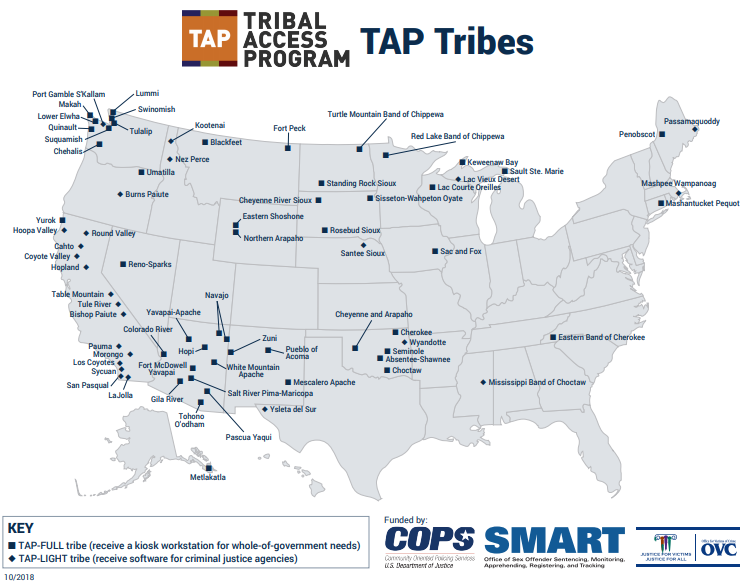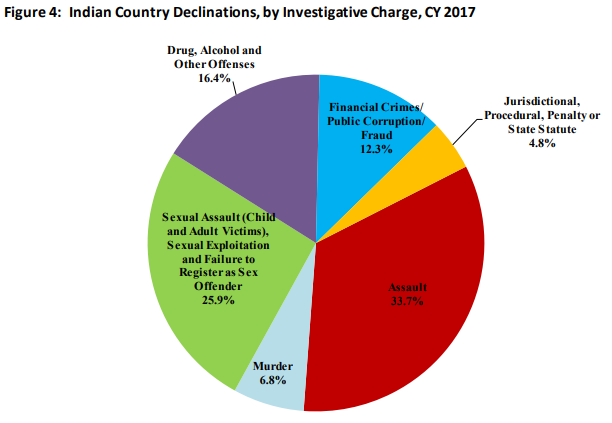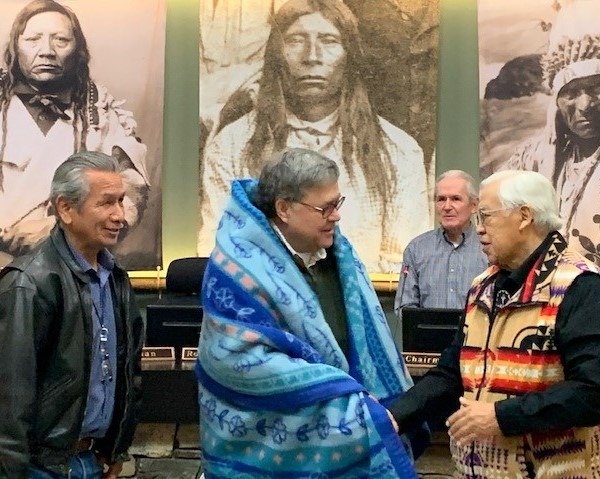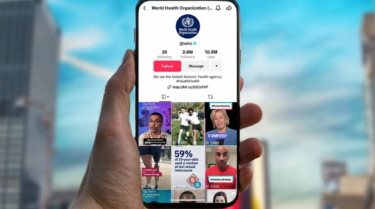The DOJ expands its Tribal Access Program to include 30 more Native American tribes that can now access criminal databases to fight crime and abuses in their communities.
“TAP provides law enforcement and tribal governments real-time access to data that can help locate a missing person, identify a dangerous fugitive or prevent a domestic abuser from obtaining a gun, among many other important functions” — Attorney General William Barr
Launched in 2015 the Tribal Access Program (TAP) focuses on “public safety in American Indian and Alaska Native communities, allowing tribes to more effectively serve and protect their communities by ensuring the exchange of critical data with federal and state databases.”
With the latest expansion announced on Monday, over 75 tribes can now exchange critical data with federal and state databases, including access to national crime information databases, kiosks, and the ability “to submit and query fingerprint-based transactions via FBI Criminal Justice Information Services (CJIS) Next Generation Identification System.”

Attorney General William Barr
“American Indian and Alaska Native people suffer unacceptable and disproportionately high levels of violence, which can have lasting impacts on families and communities”
Attorney General William Barr announced on Monday, “The Tribal Access Program is strengthening tribal governance and public safety in tribal communities across the United States.”
The need to protect indigenous communities was amplified by AG Barr, who explained last month, “American Indian and Alaska Native people suffer unacceptable and disproportionately high levels of violence, which can have lasting impacts on families and communities.”
In November AG Barr announced the launch of the Missing and Murdered Indigenous Persons (MMIP) Initiative with the support of the FBI.
Through the MMIP Initiative, the DOJ will “perform in-depth analysis of federally supported databases and analyze data collection practices to identify opportunities to improve missing persons data.”
Barr said at the time of the launch, “Native American women face particularly high rates of violence, with at least half suffering sexual or intimate-partner violence in their lifetime. Too many of these families have experienced the loss of loved ones who went missing or were murdered.”

With the understanding that crime has been historically high with few prosecutions in tribal territories, the need for access to criminal databases is due to what Reuters reported two years ago, that crime data in Native American tribal lands was “virtually useless,” and that the DOJ did “not adequately collect or use crime statistics from Native American tribes.”
Prosecuting criminals is a challenge on tribal lands because, according to a 2017 DOJ report, physical evidence is often lacking, victims are understandably hesitant to move forward, reporting is delayed, and first responder resources are insufficient.
For these reasons and more, declination rates are worryingly high. “Declination” in legal terminology is “a decision by a prosecutor not to pursue an indictment.”

Source: DOJ Indian Country Investigations and Prosecutions 2017
In 2017, the majority of declinations involved the category of physical assaults or sexual assaults, sexual exploitation, or failure to register as a sex offender.
While tribes may have their own law enforcement agencies, “jurisdiction over offenses in Indian country may lie with federal, state, or tribal agencies, depending on the particular offense, offender, victim, and offense location,” according to the Bureau of Justice Statistics (BJS).
“The Indian Self-Determination of Act 1975 affords tribes the opportunity to provide for their own police departments and other institutional services through federal grants and contracts.”
https://www.youtube.com/watch?v=oMYA2ALzkHc
Collaborating across agencies and jurisdictions requires coordinated efforts, and TAP looks to further that coordination on the data front.
“TAP provides law enforcement and tribal governments real-time access to data that can help locate a missing person, identify a dangerous fugitive or prevent a domestic abuser from obtaining a gun, among many other important functions,” said AG Barr on Monday.
“The Trump administration is committed to fixing these public safety gaps and serving victims in Indian country. I believe the expansion of this law enforcement tool will prove to be critical in achieving those goals,” he added.
Through TAP, tribes are able to:
- Register sex offenders in compliance with the Adam Walsh Child Protection and Safety Act
- Enter information to prevent illegal gun purchases
- Enter arrest warrants for on and off reservation awareness and enforcement
- Perform record checks on employees and volunteers who have contact with or control over Indian children
- Locate absent parents to enforce child support orders
- and much more
Some 80% of investigations closed by the FBI in tribal territories in 2017 were related to violent crime.

FBI Director Christopher Wray
“We reaffirm our focus on allocating resources to serve Native American needs”
“The FBI recognizes the violence that tribal communities face and is fully committed to working with our federal, state, local, and tribal law enforcement partners to provide support to those impacted by these crimes,” said FBI Director Christopher Wray on Monday.
“We are dedicated to delivering justice and to the FBI’s mission to protect all the people we serve. We reaffirm our focus on allocating resources to serve Native American needs,” he added.
There are 573 federally recognized American Indian Tribes in the United States, and the FBI has federal law enforcement responsibility on nearly 200 Indian reservations.
Approximately 75 percent of the crimes the FBI investigates in Indian Country fall under the following priority violations:
- Death investigations;
- Physical abuse of a child;
- Sexual abuse of a child;
- Violent felony assaults; and
- Rape.
Four field divisions (Albuquerque, Minneapolis, Phoenix, and Salt Lake City) account for 75 percent of all Indian Country cases opened each year.
TAP’s duty is to support tribes in analyzing their needs for national crime information with appropriate solutions, including a state-of-the-art biometric/biographic kiosk-workstation with capabilities to process finger and palm prints, take mugshots and submit records to national databases, as well as the ability to access CJIS systems for criminal and non-criminal justice purposes through the Department of Justice’s Criminal Justice Information Network.
In the end data collection is still data collection. It has tremendous potential to do good, but it can also be weaponized to do bad. It’s all about how that data is used and the trustworthiness of those who collect and analyze it.
Neil Young calls out greedy bankers, oil, media in Dakota pipeline protest song












